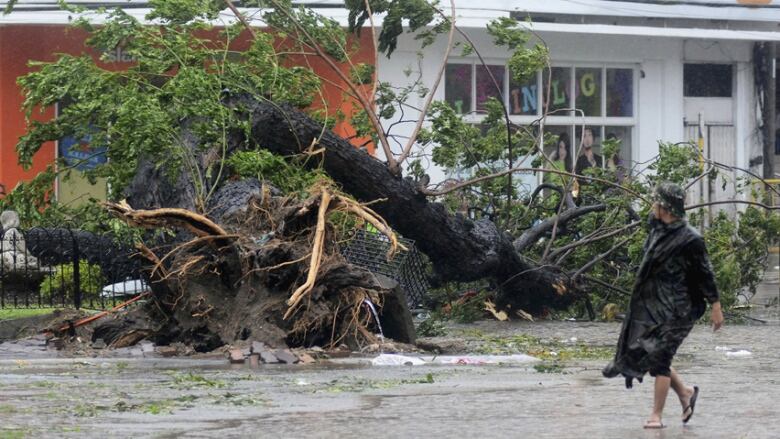Typhoon Haiyan kills over 100 in Philippines: official
Huge storm has winds as strong as a tornado, CBC meteorologist says
One of the strongest storms on record slammed into the central Philippines, killing more than 100 people whose bodies lay in the streets of one of the hardest-hit cities, an official said Saturday.
Capt. John Andrews, deputy director general of the Civil Aviation Authority of the Philippines, said more than 100 others were injured in the city of Tacloban on Leyte Island, where Typhoon Haiyan hit Friday.
With power and most communications knocked out a day after the typhoon ravaged the central region, Andrew told The Associated Press that the information about the deaths was relayed to him by his staff in Tacloban.
"The information is reliable," he said.
Nearly 750,000 people were forced to flee their homes and damage was believed to be extensive.
Weather officials said Haiyan had sustained winds of 235 km/hwith gusts of 275 km/hwhen it made landfall. By those measurements, Haiyan would be comparable to a strong Category 4 hurricane in the U.S., nearly in the top category, a 5.
Hurricanes, cyclones and typhoons are the same thing. They are just called different names in different parts of the world.

Because of cut-off communications in the Philippines, it was impossible to know the full extent of casualties and damage. Officially, four people were listed as dead as of Saturday morning, before the latest information from Tacloban came in.
Southern Leyte Gov. Roger Mercado said the typhoon ripped roofs off houses and triggered landslides that blocked roads.
The dense clouds and heavy rains made the day seem almost as dark as night, he said.
"When you're faced with such a scenario, you can only pray, and pray and pray," Mercado told The Associated Press by telephone, adding that mayors in the province had not called in to report any major damage.
"I hope that means they were spared and not the other way around," he said. "My worst fear is there will be massive loss of lives and property."
Eduardo del Rosario, head of the disaster response agency, said the speed at which the typhoon sliced through the central islands 40 km/h helped prevent its 600-kilometre band of rain clouds from dumping enough of their load to overflow waterways. Flooding from heavy rains is often the main cause of deaths from typhoons.
"It has helped that the typhoon blew very fast in terms of preventing lots of casualties," regional military commander Lt. Gen. Roy Deveraturda said. He said the massive evacuation of villagers before the storm also saved many lives.
CBC meteorologist Jay Scotland said two recent and infamous North American storms Hurricanes Sandy and Katrina pale in comparison toHaiyan, which in North Americawould be aCategory 5 hurricane,the worst classification.
"Katrina was producing sustained winds of 205 km/h when it made its second landfall in Louisiana, when we saw all that destruction in New Orleans," Scotland said. "Sandy, at its peak, was briefly a Category 3 hurricane. That produced sustained winds of 185 km/h. We're talking winds well in excess of 300 km/h.

"So really the best thing to compare this to would actually be a tornado. And we're looking at winds that are as strong as a strongF3tornado."
F3tornadoes will overturn trains, lift cars off the ground and heavily damage strong homes, Scotland said.
"Only we're not talking about a very small area, a neighbourhood or a city or a town being affected. We're talking about an entire country," he said.
With files from CBC News













_(720p).jpg)


 OFFICIAL HD MUSIC VIDEO.jpg)
.jpg)



























































































